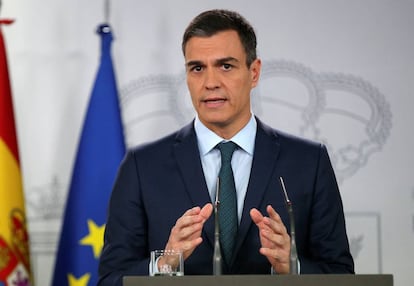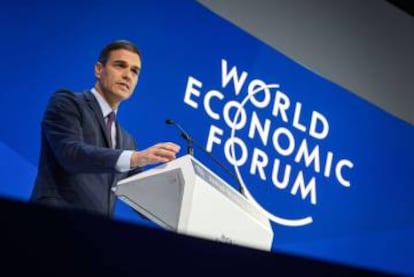Spain recognizes Juan Guaidó as interim president of Venezuela
Prime Minister Pedro Sánchez also announces a humanitarian aid program for the crisis-stricken Latin American country

Spanish Prime Minister Pedro Sánchez held a news conference on Monday at 10am to announce that “Spain officially recognizes Juan Guaidó, the leader of the National Assembly, as the interim president of Venezuela.”
Sánchez also announced that Spain will foster a humanitarian aid plan for Venezuela within the European Union and the United Nations, and asked Guaidó to call elections in the shortest possible delay.
It is the people of Venezuela who must decide their future
Spanish PM Pedro Sánchez
“In the coming hours I will contact European and Latin American governments,” said Sánchez, adding that Guaidó must now “call free elections as soon as possible” because “it is the people of Venezuela who must decide their future, and the international community must respect and verify the outcome.”
In a tweet after the six-minute press conference, Sánchez wrote: “I recognize @jguaido as interim president of Venezuela with a clear horizon: calling free, democratic presidential elections with guarantees and no exclusions. I will not take a step back. For freedom, democracy and concord in #Venezuela.”
Reconozco como presidente encargado de Venezuela a @jguaido, con un horizonte claro: la convocatoria de elecciones presidenciales libres, democráticas, con garantías y sin exclusiones.
— Pedro Sánchez (@sanchezcastejon) February 4, 2019
No daré ni un paso atrás.
Por la libertad, la democracia y la concordia en #Venezuela
Shortly later, Nicolás Maduro of Venezuela called Sánchez “a coward” and accused him of being “a puppet” at the service of the United States and Donald Trump. And Venezuelan Foreign Minister Jorge Arreaza accused CNN, BBC and the Spanish state broadcaster TVE of using “psychological warfare” in their coverage of the situation. Venezuelan dissidents in Spain said they expect the National Assembly to appoint a new ambassador this week to ensure that Venezuela will “rejoin the democratic world.”
Britain and Austria
Just minutes after Sánchez’s news conference, other countries including Britain and Austria also officially recognized Guaidó. At 10.09am, Britain’s foreign secretary Jeremy Hunt tweeted that “Nicolas Maduro has not called Presidential elections within 8 day limit we have set. So UK alongside European allies now recognises @jguaido as interim constitutional president until credible elections can be held. Let’s hope this takes us closer to ending humanitarian crisis.”
Nicolas Maduro has not called Presidential elections within 8 day limit we have set. So UK alongside European allies now recognises @jguaido as interim constitutional president until credible elections can be held. Let’s hope this takes us closer to ending humanitarian crisis
— Jeremy Hunt (@Jeremy_Hunt) February 4, 2019
And in a tweet posted in Spanish at 10.13am, Austrian Chancellor Sebastian Kurz said that “the Maduro regime has refused to date to accept free and fair presidential elections. For this reason, from now on we consider President @jguaido as the legitimate interim president in compliance with the Venezuelan Constitution.”
El régimen de #Maduro se ha negado hasta la fecha a aceptar unas elecciones presidenciales libres y justas. Por este motivo, consideramos desde este momento al Presidente @jguaido como Presidente interino legítimo de conformidad con la Constitución venezolana.
— Sebastian Kurz (@sebastiankurz) February 4, 2019
France, Germany, Sweden, Denmark and Latvia also recognized Guaidó on Monday.
EU position
Attempts by the EU to reach a common position in order to recognize Guaidó, at least implicitly, have run into opposition from a group of countries led by Italy. The differing viewpoints among EU members have to do with the wording and the deadlines to recognize the National Assembly leader as the interim president of Venezuela until new elections are called.

Monday was the deadline that Spain, Germany, France and Britain had given Nicolás Maduro to announce new elections in the crisis-ridden country.
But during a television interview with Spanish network La Sexta, Maduro said he was not contemplating either stepping down or calling new presidential elections: “I don’t take ultimatums from anybody. International politics cannot be based on ultimatums. Why should the EU order a country around?”
The joint EU position was discussed late last week by foreign ministers from the 28 member states gathered at an informal meeting in Bucharest, Romania. While no common statement on Guaidó emerged at that gathering, the EU did agree to create an international contact group to promote new elections in Venezuela.
Spain’s position
Spanish Prime Minister Pedro Sánchez had been facing internal and external pressure to recognize Guaidó as the legitimate president ever since the latter took a public oath on January 23, triggering a wave of support from countries in the Americas.
The US administration contacted the Spanish government right before Guaidó declared himself the new leader, and afterwards, it pressured for Spain and the rest of the European Union to recognize Guaidó and break all dialogue with President Nicolás Maduro.
For days, Sánchez remained silent while other leaders around him, including Emmanuel Macron of France, expressed support for Guaidó. Then, at the World Economic Forum in Davos, Switzerland, the Spanish PM phoned Guaidó and made the first public statements suggesting support for him. A few days later he described Nicolás Maduro as a “tyrant.”
English version by Susana Urra.
Tu suscripción se está usando en otro dispositivo
¿Quieres añadir otro usuario a tu suscripción?
Si continúas leyendo en este dispositivo, no se podrá leer en el otro.
FlechaTu suscripción se está usando en otro dispositivo y solo puedes acceder a EL PAÍS desde un dispositivo a la vez.
Si quieres compartir tu cuenta, cambia tu suscripción a la modalidad Premium, así podrás añadir otro usuario. Cada uno accederá con su propia cuenta de email, lo que os permitirá personalizar vuestra experiencia en EL PAÍS.
¿Tienes una suscripción de empresa? Accede aquí para contratar más cuentas.
En el caso de no saber quién está usando tu cuenta, te recomendamos cambiar tu contraseña aquí.
Si decides continuar compartiendo tu cuenta, este mensaje se mostrará en tu dispositivo y en el de la otra persona que está usando tu cuenta de forma indefinida, afectando a tu experiencia de lectura. Puedes consultar aquí los términos y condiciones de la suscripción digital.








































